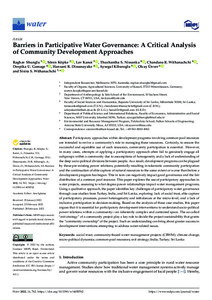| dc.date.accessioned | 2022-04-26T13:30:46Z | |
| dc.date.available | 2022-04-26T13:30:46Z | |
| dc.date.issued | 2022-02-28 | |
| dc.identifier | doi:10.17170/kobra-202204216058 | |
| dc.identifier.uri | http://hdl.handle.net/123456789/13790 | |
| dc.description.sponsorship | Gefördert durch den Publikationsfonds der Universität Kassel | ger |
| dc.language.iso | eng | eng |
| dc.rights | Namensnennung 4.0 International | * |
| dc.rights.uri | http://creativecommons.org/licenses/by/4.0/ | * |
| dc.subject | social trust | eng |
| dc.subject | community-based water management projects (CBWM) | eng |
| dc.subject | climate change | eng |
| dc.subject | micro-political dynamics | eng |
| dc.subject | common-pool resources | eng |
| dc.subject | exit strategy | eng |
| dc.subject | India | eng |
| dc.subject | Turkey | eng |
| dc.subject | Sri Lanka | eng |
| dc.subject.ddc | 320 | |
| dc.title | Barriers in Participative Water Governance: A Critical Analysis of Community Development Approaches | eng |
| dc.type | Aufsatz | |
| dcterms.abstract | Participatory approaches within development programs involving common-pool resources are intended to revive a community’s role in managing these resources. Certainly, to ensure the successful and equitable use of such resources, community participation is essential. However, in many cases, attempts at applying a participatory approach often fail to genuinely engage all subgroups within a community due to assumptions of homogeneity and a lack of understanding of the deep socio-political divisions between people. As a result, development programs can be plagued by these pre-existing power relations, potentially resulting in tokenistic community participation and the continuation of elite capture of natural resources to the same extent or worse than before a development program has begun. This in turn can negatively impact good governance and the fair distribution of a common pool resource. This paper explores the use of participatory approaches in water projects, assessing to what degree power relationships impact water management programs. Using a qualitative approach, the paper identifies key challenges of participatory water governance through case studies from Turkey, India, and Sri Lanka, exploring: lack of social trust, elite capture of participatory processes, power heterogeneity and imbalances at the micro-level, and a lack of inclusive participation in decision-making. Based on the analysis of these case studies, this paper argues that it is essential for participatory development interventions to understand socio-political power relations within a community—an inherently complex and contested space. The so-called “exit strategy” of a community project play a key role to decide the project sustainability that grants the “community ownership” of the project. Such an understanding can bring about greater success in development interventions attempting to address water-related issues. | eng |
| dcterms.accessRights | open access | |
| dcterms.creator | Shunglu, Raghav | |
| dcterms.creator | Köpke, Sören | |
| dcterms.creator | Kanoi, Lav | |
| dcterms.creator | Nissanka, Thushantha S. | |
| dcterms.creator | Withanachchi, Chandana Rohana | |
| dcterms.creator | Gamage, Deepika U. | |
| dcterms.creator | Dissanayake, Hansani R. | |
| dcterms.creator | Kibaroglu, Aysegul | |
| dcterms.creator | Ünver, Olcay | |
| dcterms.creator | Withanachchi, Sisira Saddhamangala | |
| dc.relation.doi | doi:10.3390/w14050762 | |
| dc.subject.swd | Indien | ger |
| dc.subject.swd | Türkei | ger |
| dc.subject.swd | Sri Lanka | ger |
| dc.subject.swd | Vertrauen | ger |
| dc.subject.swd | Wasserwirtschaft | ger |
| dc.subject.swd | Klimaänderung | ger |
| dc.subject.swd | Mikropolitik | ger |
| dc.type.version | publishedVersion | |
| dcterms.source.identifier | eissn:2073-4441 | |
| dcterms.source.issue | Issue 5 | |
| dcterms.source.journal | Water | eng |
| dcterms.source.volume | Volume 14 | |
| kup.iskup | false | |
| dcterms.source.articlenumber | 2217 | |


